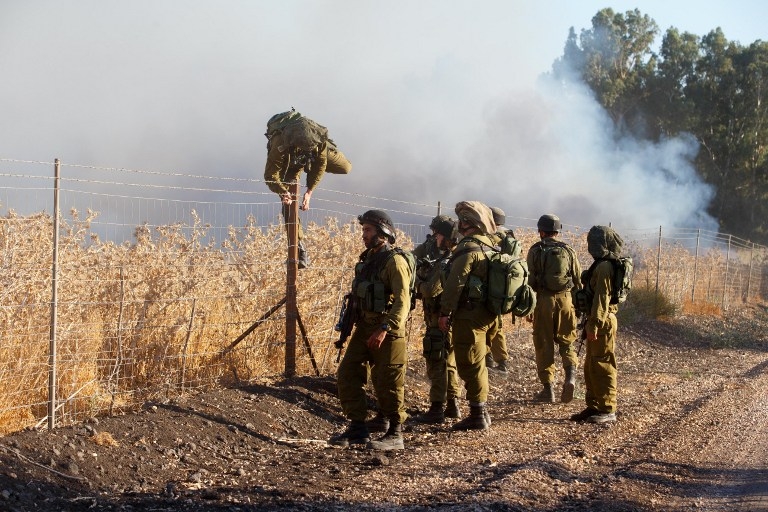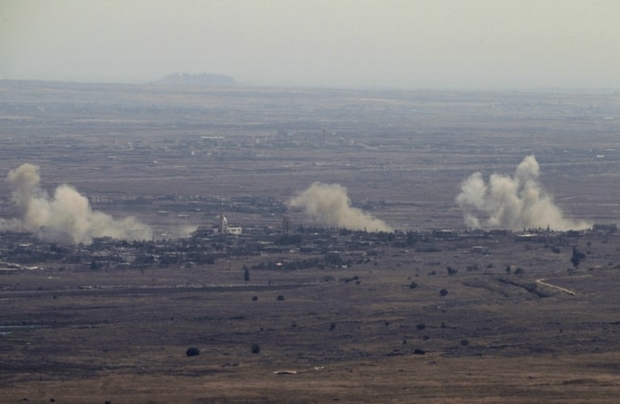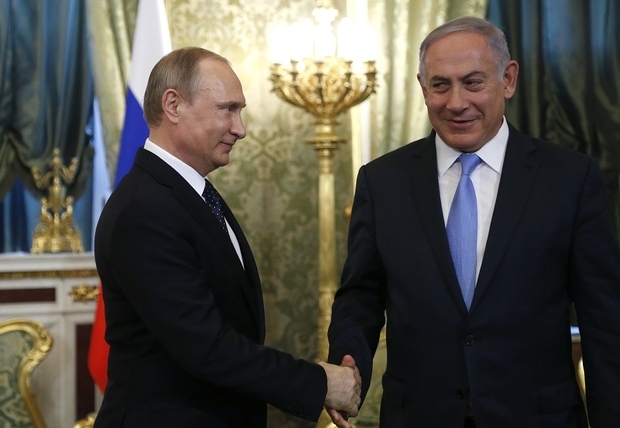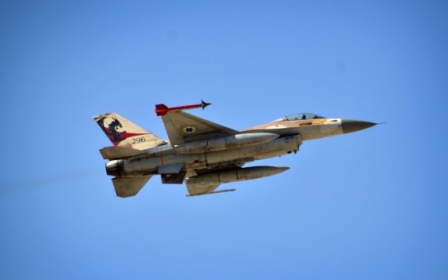Israel's window to hit weapons convoys in Syria is closing – and fast

It happened again this week.
Citing military sources, Syria’s official news agency, SANA, reported on Wednesday that Israel had launched a ground-to-ground missile attack at 3am against the Mezzeh military air field near Damascus. Other media reports claimed the attack was carried out by the Israeli air force.
According to the Syrian officials, the strike was a “desperate” effort by Israel to support “terrorist groups” fighting the regime. Hours later, Israeli Defense Minister Avigdor Lieberman told a meeting of EU envoys that his country was “trying to prevent the smuggling of sophisticated weapons, military equipment and weapons of mass destruction from Syria to Hezbollah”.
As far as Israeli security interests are concerned, it’s business as usual – except it’s not. It’s all an illusion
As a matter of policy, Israel neither confirms nor denies reports of such attacks, many of which have occurred in recent years, and they are typically thought to target weapons bound for the Shia group – but Lieberman’s comments are especially striking because this is the first time WMD has been mentioned.
If indeed Israel attacked the airport this morning, it would be the third Israeli attack within 10 days after two other reported attacks by the Israeli Air Force in the last week of November.
The first strike hit the Syrian side of the Golan Heights on 28 November, near the border between the two countries, and targeted an abandoned UN peacekeeping facility used by the Islamic State (IS).It followed an attack on an Israeli troops by the Syrian rebel group Khalid Ibn al-Walid Brigade, formerly known as the Yarmouk Martyrs Brigade, affiliated with IS.
Two days later, the second strike hit the outskirts of Damascus in an attack that was again widely thought to have targeted a shipment of sophisticated weapons headed for Hezbollah in Lebanon.
So it would seem that, as far as Israeli security interests are concerned, it’s business as usual – except it’s not. It’s all an illusion.
One year, five strikes
In addition to the strike this morning and the two strikes in November, the Israeli Air Force have attacked weapons convoys from Syria to Hezbollah twice in the past 11 months.
Russia has a massive presence in Syria including 50 fighter planes and bombers, navy destroyers and sophisticated anti-aircraft radars which practically cover the entirety of Israel
These five strikes in 2016 stand in sharp contrast to dozens of reports about similar attacks since 2013. It seems that since the Russians deployed their forces - mainly air force - to Syria, Israel has dramatically reduced its air operations in the country out of fear of stepping on Russian toes and bringing Vladimir Putin’s wrath upon them.
Russia has a massive presence in Syria with 50 fighter planes and bombers, assault helicopters, navy destroyers, corvettes, aircraft carriers, batteries and sophisticated anti-aircraft radars, which practically cover the entirety of Israel.
This deployment has been a game changer in the bloody civil war and has helped the Assad regime to consolidate its declining power.
Now with murderous tactics in Aleppo borrowed from Russian experience of scorch war in Chechnya a decade or so ago, Assad and Russia seem to have the upper hand at the expense of thousands of killed and wounded civilians. Nevertheless, the civil war is far from over.
Too close for comfort
The air strikes near the border against IS – a common enemy of all involved in the war - can be understood, tolerated and even encouraged by Russia.
But when it comes to areas further from the Israeli border, certainly those near Damascus, the operation is much more complicated, risky and can get out of control.
Such a mission is necessarily very sensitive. Though the 28 November attack was aimed, indirectly, against Hezbollah, it will have been interpreted - and rightly so - as also a strike against the Assad regime, which is either responsible for the weapons shipments being sent to the group or is turning a blind eye.
And a strike against Assad can be indirectly perceived as an assault or humiliation of Russia, which is behind the regime. Indeed, it was reported that after the attack Russia asked Israel for a clarification of what it was up to.
Breaking the rules
Soon after Russia deployed its forces in Syria in spring-summer 2015, Israel was nervous and Israeli Prime Minister Benjamin Netanyahu rushed to Moscow to appease Putin.
In the meeting and, in subsequent ones, the two sides established a special red line link for “deconflicting”, to avoid unintended clashes between the two sides.
There is a limit to what they can inflict upon Damascus. Not because of Assad but because of his patron – Putin
Since then, Netanyahu has travelled three more times in the past year to Moscow for further talks with Putin. Subsequently, senior IDF and IAF officers met with their Russian counterparts to define the rules of the game over Syrian airspace.
Despite these arrangements, it is very unlikely that Israel informed Russia ahead of this morning or the 28 November attack. Nations don’t do that, even with their friends, because it may very well jeopardise an operation and risk lives.
One can also assume that the intelligence was excellent and that there was operational feasibility. Another conclusion which can be drawn from the incidents is that maybe Israel developed such sophisticated measures that its planes were not detected or even “blinded” by the Russian radars.
How long can the double game last?
In the past, Netanyahu, former defence minister Moshe Ya'alon and his successor Avigdor Lieberman have repeatedly said that Israel has no intentions of getting involved in the civil war, but would religiously defend its national interests.
They include retaliation for, intentional or not, every violation of Israeli sovereignty and prevention of shipments of sophisticated weapons to Hezbollah in Lebanon.
Israel is mainly concerned about the Yakhont land-sea cruise missiles, anti-aircraft batteries and radars and components which will increase the accuracy of Hezbollah ground-to-ground missiles, capable of hitting almost every strategic or military site in Israel including the nuclear reactor in Dimona, IDF headquarters in Tel Aviv, power stations and air fields.
Most probably these were the targets in the last Israeli strike in Syria, with the additional fine tuning by Lieberman that Israel is also concerned about transfers of weapons of mass destruction to Hezbollah.
It is, however, important to stress that Israel is also very careful to keep from violating Lebanese sovereignty. In the past – after an IAF strike on Lebanese soil - Hezbollah has threatened to retaliate. For the Shia Lebanese movement, Israeli strikes on Syrian soil are tolerable, but not in Lebanon.
The Assad regime promised in the past to retaliate for the violation by Israel of its airspace and sovereignty. But IDF strategists and planners know that these are empty threats. Assad can’t allow himself – and is actually incapable - of opening another front, especially one with the mighty Israeli military.
But they also know that there is a limit to what they can inflict upon Damascus. Not because of Assad but because of his patron – Putin.
There are two possibilities to explain the increased number of Israeli attacks in the last two weeks. One is that Israel is brazenly challenging Russia and playing a game of chicken with Putin.
But given Lieberman’s comments about WMD, it is more likely that Russia is playing a double game. It defends the Assad regime, but also understands the vital Israeli national interests and turns a blind eye when Israel takes action to defends these interests.
The operational military freedom which Israel has enjoyed to do whatever it likes in Syria since the civil war broke out nearly six years ago is narrowing. Israeli military and government know very well that Putin’s patience is running out.
- Yossi Melman is an Israeli security and intelligence commentator and co-author of Spies Against Armageddon.
The views expressed in this article belong to the author and do not necessarily reflect the editorial policy of Middle East Eye.
Photo: Israeli soldiers inspect a field where rockets fired from Syria landed near Kfar Szold in northern Israel, close to the Golan Heights and the border with Lebanon. Israel launched artillery and air strikes against Syrian army positions in the Golan Heights in response (AFP)
New MEE newsletter: Jerusalem Dispatch
Sign up to get the latest insights and analysis on Israel-Palestine, alongside Turkey Unpacked and other MEE newsletters
Middle East Eye delivers independent and unrivalled coverage and analysis of the Middle East, North Africa and beyond. To learn more about republishing this content and the associated fees, please fill out this form. More about MEE can be found here.







